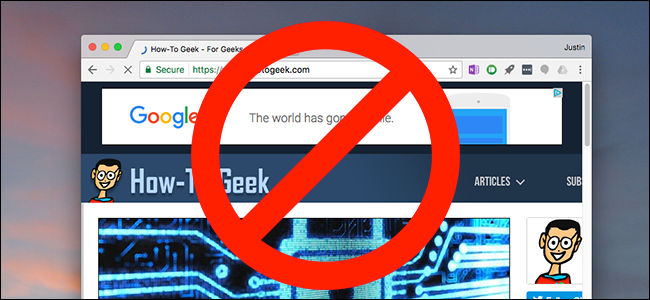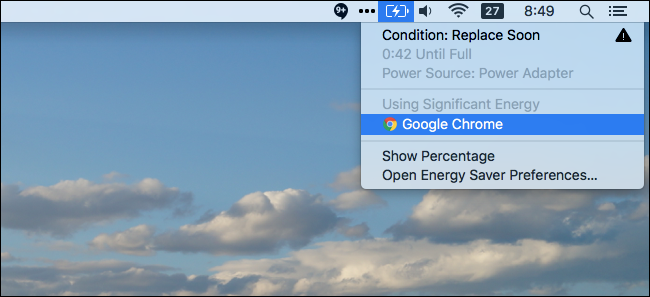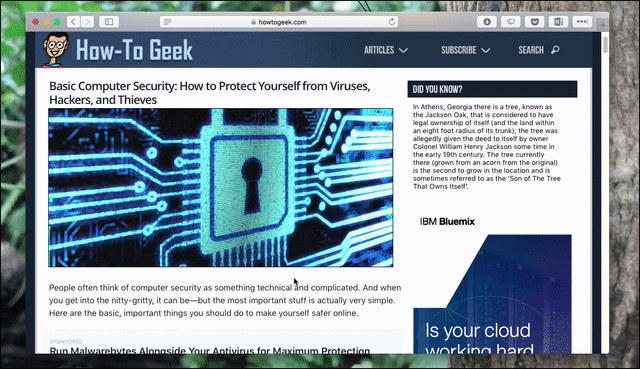Quick Links
Listen: I know you love your Google Chrome. You've got your massive collection of extensions, your favorite pinned tabs, and there's even that colorful theme you added sometime in 2013. You're comfy in Chrome. I get it.
I was too, and thought Safari was a stripped-down, no-features excuse for a browser. But then I tried it.
And at some point between then and now, Safari got good. Really good. I'm not saying it's the browser for everyone, but I will say that every Mac user should at least give Safari a try, because it does a lot of things better than Chrome (or any other browser, for that matter). Here are a few.
Better Battery Life, and Better Performance on Older Macs
Browsers can be optimized for efficiency or for speed---it's hard to really do both. Chrome, for the most part, focuses on speed; Safari focuses on efficiency. It's understandable if you'd rather have a faster web browsing experience: that's all some users care about. But there are some very good reasons to focus on efficiency.
Power usage is the most obvious one. As our testing shows, Chrome beats Safari when it comes to benchmarks, but Safari does way better in terms of battery life. If you're using a MacBook, replacing Chrome with Safari can improve your battery life, in some cases by a couple of hours.
You don't have to take my word for it: check which applications are draining your MacBook's battery and Chrome will always top the list, unless you're converting video or something.
Chrome rides your CPU hard, and while it is getting better about battery life, it's still no match for Safari. And if you're using an older Mac, Safari might actually perform better for you.
On my 2011 MacBook Pro, starting up Chrome is a surefire way to trigger the fans and slow down the rest of my system. Switching to Safari, for me, makes every other program on my device a little faster. And yes: I could upgrade my laptop. That's absolutely a fair thing to say. But when I use Safari, I don't feel like I have to. Are Chrome's features worth $1000 or more to you?
Content Filters Are Better Than Ad Blockers
If you're a longtime Chrome user, you probably turn to something like uBlock Origin or AdBlock Plus to stop ads from mucking up your browser. And while there's nothing wrong with either of those options, they do have a downside. Due to the way Chrome works, they look at sites after they're downloaded, and retroactively remove the blocked content. That slows you down, and uses resources.
Safari is different. Apple offers a content blocking API, which extension makers can use to prevent ads from ever being downloaded in the first place. As Apple explains to developers:
Content-blocking rules are created in a structured format ahead-of-time, declaratively, rather than running extension-provided code at the moment a decision about blocking needs to be made. WebKit compiles the ruleset into a bytecode format that it can process efficiently at runtime, reducing latency between when a page request is created and when it is dispatched over the network. Safari does not request undesired content. By avoiding unnecessary or unwanted downloads, Safari uses less memory and has better performance.
If this sounds like nonsense to you, download Wipr in Safari and compare it to your Google Chrome setup. I bet you'll be surprised what a difference this makes, both in terms of performance and battery life. There's no reason Chrome couldn't offer a content blocking API. But don't hold your breath for Google, the biggest advertising company in the world, to prioritize that.
Reader Mode Makes Every Site Better
Even if you don't use ad blockers for moral reasons, some websites glut of ads and terrible typographic choices make reading a chore. Safari offers a built-in way to deal with this: Reader Mode. Click one button and the text of the article you're reading is extracted and put on a clean slate.
This makes reading a lot more pleasant. And while there are alternatives to this for Chrome, they all come as browser extensions or bookmarklets, and none work very quickly or seamlessly, at least in my experience. Every time I try to quit Safari, Reader Mode is what pulls me back in.
Safari Syncs With Your iPhone and iPad
If you're an iPhone or iPad user, it's hard to match the integration between Safari on your Mac and Safari on your iOS device. Your tabs and bookmarks sync seamlessly, and Continuity is fully supported. Your read list syncs from phone to laptop. Passwords saved on one device are accessible on another. We could go on.
Chrome does this as well, but you have to use Chrome on your iPhone too---but Safari is the default browser in iOS, with no way to change it. So Chrome's syncing won't be nearly as seamless, since some apps will send you to Safari when you click on links.
Put simply, if you're an iPhone user, using Safari makes your life a lot easier.
Chrome Does Some Things Better, But Not Everything
We could not have written this article five years ago. A lot of these features are new-ish, and Safari's extensions ecosystem was so terrible for so long that everyone jumped ship for Chrome, which is the main reason so many Mac users are still there. And to this day, if you love extensions, you've got a lot more choice on Chrome. That's just how it is.
Chrome does a lot of other things well, including performance and integration with Google's ecosystem. But Safari in 2017 has a lot of strengths, and if you've been ignoring it you should check it out.
You might be surprised. I was.



